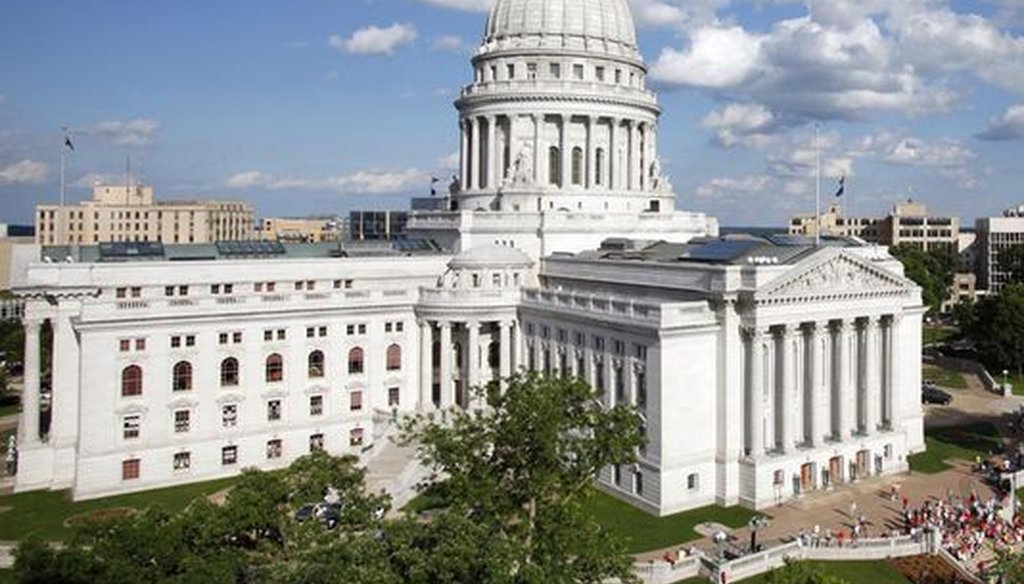

Our only agenda is to publish the truth so you can be an informed participant in democracy.
We need your help.


The Wisconsin Capitol isn't nearly large enough to house all state agencies. (AP)
Then-Gov. Jim Doyle argued the projected shortfall was as low as $1.5 billion in 2010, but others placed the figure at more than $2 billion.
Estimates show a historic budget surplus of more than $7.1 billion at the end of the current fiscal year.
But the claim glosses past at least $19.9 billion in COVID-19 pandemic-related relief sent to state and local governments, helping bolster Wisconsin’s economy.
With Gov. Tony Evers, a Democrat, poised to release the 2023-25 state budget on Feb. 15, 2023 deficits and surpluses in Wisconsin have again come to the forefront of the debate.
In his state of the state speech, Evers gave a bit of a preview of his budget, outlining more than $1 billion in new spending. Republicans, who control the Legislature, called his plans too expensive – and pledged to toss aside his budget and start from scratch.
All of this even as, in December, officials said the state’s budget surplus was at an all-time high.
In a Jan. 3, 2023 address to the state Senate, Senate Majority Leader Devin LeMahieu, R-Oostburg, credited action by former Gov. Scott Walker, a Republican, and the GOP-led Legislature with putting the state on a solid financial footing:
"In 2010, we inherited a multi-billion dollar deficit," he said. "Over the last 12 years we have focused on investing in core priorities, responsible budgeting, reducing the tax burden on the hard- working families of Wisconsin and passing meaningful legislative reforms. Today we are looking at a projected surplus approaching 7 billion."
We’re interested in the first and last part of the statement: Was there a "multi-billion dollar deficit" in 2010, and is it nearing $7 billion now?
As we examine the claim, we’ll also look at what other factors were at work.
In 2010, there was considerable debate around the size of the gap in the budget.
Then-Gov. Jim Doyle, a Democrat, argued the projected shortfall was as low as $1.5 billion. But his administration’s official budget statement suggested it was closer to $2.2 billion.
Here’s what we wrote in a Nov. 29, 2010 fact-check:
"Even Department of Administration Secretary Daniel Schooff, who signed the deficit report, says $2.2 billion – not $1.5 billion – is the best starting point because the Medicaid and patient fund monies likely will fall to the state to cover."
Indeed, the Legislative Fiscal Bureau had estimated that the shortfall could be as much as $2.7 billion. And University of Wisconsin-Madison economist Andrew Reschovsky estimated it could even reach $3.1 billion.
So, on the first part of the claim, LeMahieu is on target.
On the second half of the claim, it has been well reported that estimates show a historic budget surplus of more than $7.1 billion at the end of the fiscal year.
But by simply highlighting Republican policy moves over the past decade-plus, LeMahieu glosses past the pandemic in the room.
As a Dec. 19, 2022 report by the Milwaukee Journal Sentinel noted: "While the governor's office and the state legislative branch would like to take credit for prudent financial planning it's the federal government that helped reduce state spending and boosted state revenues by enacting pandemic relief bills in 2020 and 2021."
That includes bills such as the American Rescue Plan (ARP), passed in March 2021 under President Joe Biden, and the Coronavirus Aid, Relief, and Economic Security (CARES) Act, passed in March 2020 under President Donald Trump. There was also the Families First Coronavirus Response Act also in March 2020.
A June 2022 Wisconsin Policy Forum report estimated that state and local governments collected at least $19.9 billion in COVID-19 pandemic-related funds.
That funding ultimately bolstered Wisconsin’s economy, Jason Stein, research director at the Wisconsin Policy Forum, told the Journal Sentinel.
In the report, Stein noted that during the height of the Great Recession from 2009 through 2011, the state heavily used federal relief funds for both K-12 school aid and Medicaid.
"When those funds ran out, the state faced a difficult 2011-13 budget and ultimately cut state aid to schools and local governments substantially," he wrote.
So, on this part, LeMahieu accurately quotes the number, but leaves out a key detail.
In a Senate address, LeMahieu claimed: "In 2010, (Wisconsin Republicans) inherited a multi-billion dollar deficit. ... Today we are looking at a projected surplus approaching 7 billion."
He is right on the numbers, but in skipping past the role federal aid played in keeping state and local budgets afloat during the height of the pandemic, he’s ignoring important information.
Our definition of Mostly True is "the statement is accurate but needs clarification or additional information.
That fits here.
WisPolitics, LFB projects $7.1 billion surplus at end of fiscal year, Jan. 25, 2023.
Milwaukee Journal Sentinel, Tax cuts, education reform and marijuana. What to expect in the upcoming Wisconsin state budget debate, Jan. 27, 2023.
Milwaukee Journal Sentinel, Budget surplus pushes Wisconsin's financial reserves to an all-time high. But how did we get here?, Dec. 15. 2022 (updated Dec. 19, 2022).
Milwaukee Journal Sentinel, Report on Wisconsin’s budget deficit contains hidden costs, Nov. 19, 2010.
Milwaukee Journal Sentinel, Projections of state budget deficit grow, Sept. 22, 2010.
Wisconsin Policy Forum, A golden opportunity for Wisconsin, June 2021.
PolitiFact, Wisconsin’s projected state budget shortfall is now as low as $1.5 billion, Nov. 29, 2010.
In a world of wild talk and fake news, help us stand up for the facts.
